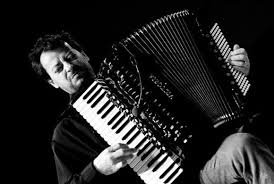 Albanian musician, but Italian by adoption and action, Admir Shkurtay is an accordionist deeply creative and very interesting. From his unique playing emerges accurate sound research and an improvise style oozing of brilliant digressions, free and fascinating contaminations that wink to the Balkan music, to folk music and the dodecaphonia technique. Through this interview he tells his most significant human and professional experiences.
Albanian musician, but Italian by adoption and action, Admir Shkurtay is an accordionist deeply creative and very interesting. From his unique playing emerges accurate sound research and an improvise style oozing of brilliant digressions, free and fascinating contaminations that wink to the Balkan music, to folk music and the dodecaphonia technique. Through this interview he tells his most significant human and professional experiences.
When and how was your lucky meeting with music born?
I was 6 years old, when I heard my uncle, who is blind, played the accordion. I was wondering where all those sounds come out and how they were harmonized: magic.
Why did you decide to dedicate your artistic life to the accordion?
From the first meeting with this instrument I decided, without asking myself too many questions, to become an accordionist. Then I began to study when I was 12 years. During the life, some decisions are taken without doubt. These are choices that testify to a real need.
What is your training on the study of this instrument?
Initially self-taught. I remember I played two-handed Danube waltz just only seeing performed it. Later I followed the “preaccademici” courses to enter the art school in Tirana. The accordion studies were completed with the high school leaving qualification and after I dedicated myself to the composition.
What are the most interesting technical aspects of the accordion?
For me the accordion is a factory of sounds that we must pull out. So, I have an idea very far from the passionate, sensual and melodic accordion.
From your erudite playing perceive various influences due to Albania, your beautiful homeland, which cleverly combine with jazz. How and why did this stimulating stylistic syncretism?
He was born during the time. The first meeting with jazz music was shocking. I remember a concert of David Perez that made me lose my word for a few days. From there, the training course jazz, then the years of world music (1997-2000) and the restoration of Balkan music (put aside by me). Later I experienced the merging of the various languages. I also experimented with contemporary sounds. Basically, separate roads which then come together after a long path of doubt and suffering.
You are an accordionist and composer particularly complex. What is your approach to the composition?
The composition is complex because it is the result of brain process, it can not be otherwise. It needs the extra-musical meditation, which involves a need to use the brain side. Mine is a classic / contemporary approach to the composer, as well as instrumentalist improviser. This probably makes my most accessible compositions.
You moved from Albania to Italy. This way of life has seriously affected your career?
Absolutely! On all levels: musical, emotional and linguistic. I owe a lot to Italy.
What are the similarities and the most significant musical differences between your country and Italy?
There are absolutely no, at least until the 90s’, when I lived there. The sea has divided much and the history of the two countries has been very different. We resemble more to Eastern Europe and the Middle East for culture and history. Of course, today the cultures change.
Nowadays, who is the most representative musician of Albania?
I do not know…
You have in mind new recording projects?
Yes, many. I would work to build realities that deal with contemporary languages in Salento, because I believe that there is great need of this.
Questo post è disponibile anche in: Italian

 English
English Italiano
Italiano 





Leave a comment
You must be logged in to post a comment.